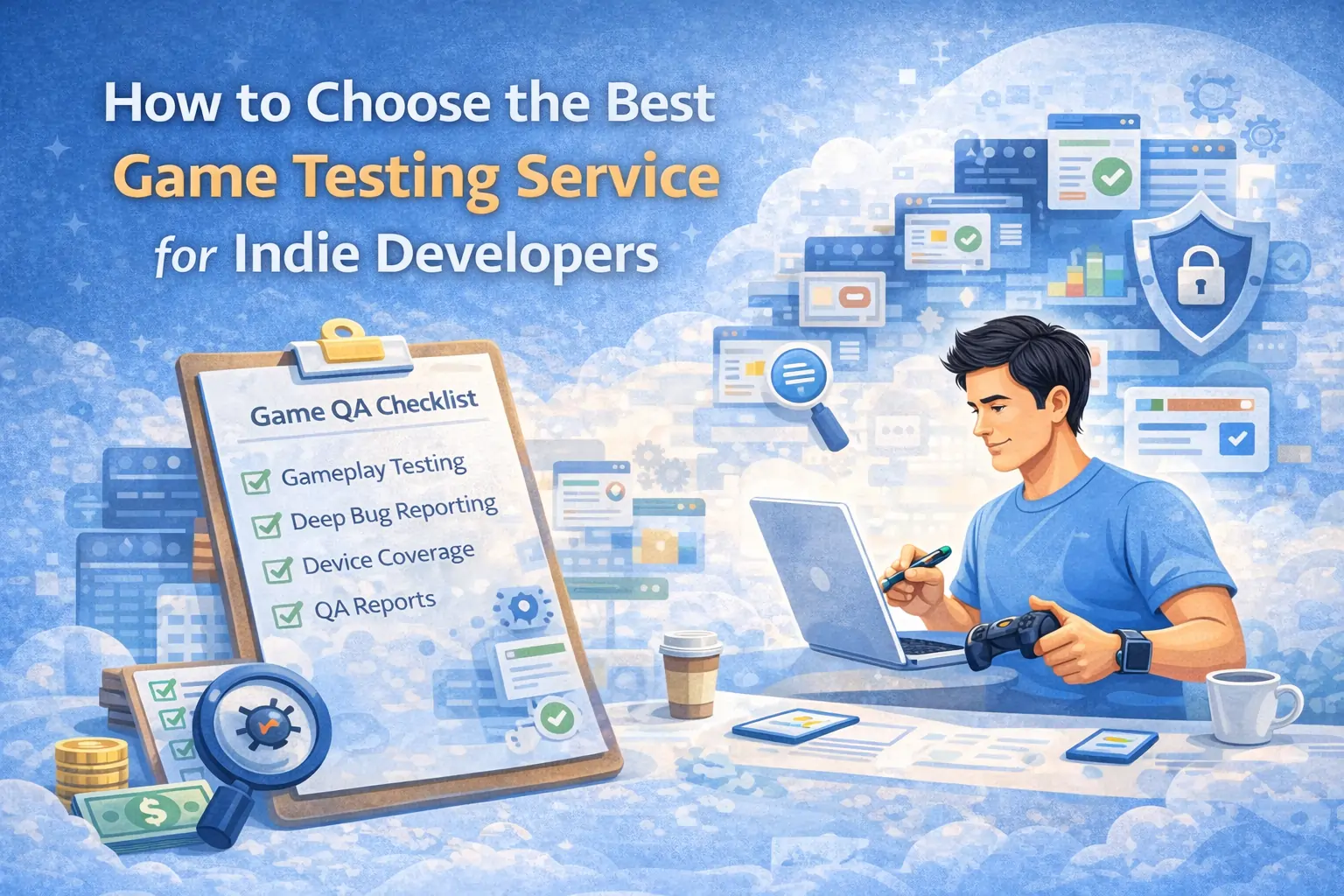Best Game Testing Service For Your PC Game
A successful game launch is not just about innovative ideas and artistic execution; it also requires delivering a smooth, bug-free experience that meets player expectations. This is where game testing services are crucial. By identifying and resolving potential problems before the game goes live, these services help mitigate the risks of negative feedback, player frustration, and expensive patches post-launch.
With so many game testing services available, finding the right one to fit your specific needs can be overwhelming. Whether you are an independent developer or part of a larger studio, selecting the right PC game testing service is a key decision in your development journey. In this blog, we will explore the various types of game testing available, essential considerations for choosing a service, effective budgeting approaches for testing, and case studies that highlight the vital role of thorough testing in successful game development.
A. Types of Game Testing
Every game testing service focuses on specific aspects of game functionality. While different games require different approaches, some fundamental types of testing are essential for every title, especially PC games with their wide array of hardware configurations and operating systems.
Functional Testing
Functional testing ensures that your game’s core mechanics work as intended. This process involves checking everything from basic features like movement and shooting mechanics to complex systems like progression, achievements, and in-game purchases. Functional testers examine if gameplay mechanics align with game design documentation and if any feature is malfunctioning.
- Bug Identification: Functional testers will find and document bugs related to gameplay, user input, character behavior, and more.
- Gameplay Flow: Ensures smooth progression from one level or stage to another without causing unnecessary crashes or errors.
Performance Testing
PC games need to run smoothly across different hardware configurations, which makes performance testing a vital aspect of quality assurance. This type of testing evaluates how well a game performs under various conditions, including different graphics cards, processors, and screen resolutions. It also examines frame rates, CPU usage, and RAM consumption.
- Frame Rate Stability: Testing ensures the game can maintain steady frame rates across low, mid-range, and high-end PCs.
- Stress Testing: Performance testers push the game to its limits by overloading the CPU or GPU to identify bottlenecks.
Usability Testing
Usability testing focuses on the player experience, assessing how intuitive and enjoyable your game is to play. This type of testing is critical for user interfaces, tutorials, and game mechanics. A game that is difficult to navigate or unintuitive can frustrate players, reducing player retention.
- User Feedback: Testers gather feedback on how easy it is to understand gameplay, menus, and controls.
- Player Experience: They test the overall experience to ensure players aren’t confused or stuck due to poor design choices.
Compatibility Testing
Compatibility testing is particularly important for PC game testing services because of the wide variety of hardware and software configurations. Ensuring that your game works across different versions of Windows, graphics drivers, and processors can prevent players from encountering errors or crashes due to compatibility issues.
- Operating Systems: Ensures that the game runs well on Windows 10, 11, and earlier versions.
- Hardware Configurations: Testers check the game’s compatibility with various graphics cards, processors, and peripherals (like game controllers).
Depending on the complexity of your game, you may need a combination of functional, performance, and usability testing. For multiplayer games, additional network and load testing may be required. Smaller developers may opt to start with functional and performance testing, while larger studios might need a comprehensive approach to cover all bases.
B. What to Look for in Game Testing Companies: Key Factors in Evaluating Providers
Choosing the right game testing company is as essential as the specific testing methods you employ. The provider you select should have the expertise, resources, and experience to meet your game’s unique demands. When evaluating potential service providers, several critical factors should be taken into account.
Expertise in PC Game Testing Services
Experience in the specific genre or platform of your game is crucial. For instance, a company with a strong background in testing platformers might not be suitable for a first-person shooter or a large-scale multiplayer online game (MMO). It’s wise to look for firms with a proven history in PC game testing services. Companies that have tested a variety of genres and platforms are often better equipped to identify common bugs and performance issues, thus accelerating the overall testing process.
Testing Methodologies
Game testing involves both manual and automated testing. Manual testing is necessary to find nuanced issues and bugs that automated testing may miss, while automated testing is ideal for repetitive tasks like regression testing.
- Manual Testing: Allows human testers to explore the game creatively, catching gameplay or usability bugs that might not be detected by automated scripts.
- Automated Testing: Perfect for running repetitive tests like performance benchmarks, especially for regression testing after updates or patches.
Scalability and Turnaround Time
For larger games, particularly multiplayer titles, scalability is important. The game testing service should be able to handle mass testing across thousands of sessions to simulate load conditions on servers. This is especially important for games that rely heavily on online interactions.
Turnaround time is another critical factor. The best companies provide timely feedback and reports without sacrificing thoroughness. This allows developers to resolve issues promptly, especially during time-sensitive stages like beta releases.
Effective Communication
Smooth communication between your development team and the testing company is critical. Detailed reports, clear communication channels, and prompt feedback ensure that bugs are addressed before they snowball into larger issues.
Look for companies that offer real-time reporting tools and regular updates on testing progress. The ability to communicate directly with testers also helps resolve issues faster.
C. Budgeting for Testing Services: How Much Should You Invest in Quality Assurance?
Quality assurance is frequently an overlooked and underfunded element of game development. However, skimping on this crucial phase can lead to major problems, including expensive post-launch patches, unfavorable reviews, and dissatisfied players. To prevent these issues, it’s vital to allocate an adequate budget for game testing services.
How to Set Your Testing Budget
Experts usually advise developers to earmark 5-10% of their total development budget for quality assurance. The specific amount depends on the complexity of the game. More sophisticated projects, especially those that incorporate online features or extensive single-player content, will require a larger financial commitment compared to simpler games.
- Indie Games: Smaller indie titles may only require basic functional and performance testing, which can result in a more limited testing budget.
- Complex RPGs or Multiplayer Titles: These games often need comprehensive testing, including functional, performance, network, and stress testing, leading to a higher overall investment.
Outsourcing Testing
Outsourcing PC game testing to dedicated companies can often be a more budget-friendly option than employing an in-house testing team. These game testing firms usually provide adaptable pricing structures that cater to the scope and duration of your project. Many also have tiered pricing models, allowing you to select specific testing services that align with your financial plan.
The Significance of Security Testing
For games that include in-app purchases or handle sensitive user information, security testing is crucial. Ignoring this critical aspect can lead to significant vulnerabilities, increasing the risk of hacking, cheating, or even exposing player data. While adding security testing to your budget may increase costs, it is a necessary investment to ensure the safety of your game and the protection of your users’ data.
D. Top Challenges in PC Game Testing and How to Overcome Them
As the gaming industry rapidly evolves, PC game testing has become increasingly complex. With a diverse array of hardware configurations, online multiplayer scenarios, and player expectations, developers must navigate various challenges to ensure a smooth gaming experience. Utilizing specialized game testing services can help mitigate these challenges. Here are the top challenges in PC game testing and effective strategies to overcome them.
1. Hardware Compatibility: Testing for Different PC Setups and Specifications
The diversity of PC configurations presents a significant hurdle in game testing. From budget systems with minimal specifications to high-end rigs with cutting-edge technology, ensuring that a game performs well across a wide range of setups is crucial for player satisfaction. Without proper testing, issues such as crashes, graphical glitches, and performance drops may arise, alienating potential players.
- Wide Range of Configurations: Players use various operating systems (Windows, Linux) and hardware (graphics cards, processors, RAM), leading to performance variability.
- Hidden Bugs: Bugs that occur on one specific configuration may not appear on another, making it essential to test across as many setups as possible.
To overcome these challenges, consider the following approaches:
- Engage Professional Game Testing Services: Utilizing specialized game testing services can provide access to a diverse range of hardware setups. These services often have established testing labs equipped with multiple configurations, ensuring comprehensive coverage.
- Cloud-Based Testing Solutions: Leverage cloud-based platforms that simulate different PC configurations. This technology allows testers to identify hardware-specific issues without the need for extensive physical setups, making testing more efficient and cost-effective.
2. Multiplayer Game Testing: Handling Network Lags and Connectivity Issues
Multiplayer games face unique challenges related to network stability, latency, and synchronization among players. Poor performance in these settings can lead to frustration and a loss of player retention. Ensuring a smooth experience in multiplayer scenarios is critical to a game’s success.
- Network Variability: Multiplayer environments must handle various network conditions, including low bandwidth and high latency, which can significantly impact gameplay.
- Player Synchronization: Lag or connection issues can lead to discrepancies between players’ actions, disrupting the overall gaming experience.
To address these challenges:
- Utilize Game Testing Services for Network Simulation: Game testing services can simulate different network conditions, such as bandwidth limitations, packet loss, and latency spikes. This approach allows developers to stress-test multiplayer components and evaluate how the game performs under various conditions.
- Load Testing Tools: Employ load testing tools through game testing services that can simulate multiple players connecting to the server simultaneously. This helps identify potential server bottlenecks and ensures smooth gameplay under high traffic.
3. Performance Testing: Ensuring Smooth Gameplay Across Varying Frame Rates
Frame rates are a critical aspect of player experience, especially across different PC setups. Stuttering or lagging can lead to dissatisfaction and negative reviews. Thorough performance testing is essential to guarantee smooth gameplay that meets player expectations.
- Frame Rate Expectations: Many players expect a minimum of 60 FPS for a seamless experience, and any drops below this can negatively impact gameplay.
- Impact of Performance Issues: Performance dips can detract from immersion and overall quality, especially in action-packed games where responsiveness is crucial.
To enhance performance testing:
- Conduct Comprehensive Performance Testing: Game testing services specialize in performance testing, using stress tests to identify performance dips and bottlenecks across various scenarios. This helps developers pinpoint areas requiring optimization.
- Optimize Graphics Settings: Collaborate with game testing services to analyze graphics settings and engine performance. Adjustments may include simplifying assets, optimizing shaders, and improving overall engine efficiency to enhance frame rates across all setups.
E. Case Studies: Success Stories of PC Games Improved Through Thorough Testing
Many successful PC games owe their polished releases to comprehensive testing. Here are a few examples where PC game testing services made a significant difference:
Case Study 1: Multiplayer RPG
A popular online RPG faced severe server instability and gameplay imbalances during its beta testing phase. After partnering with a professional game testing service, the developers implemented load testing, server stress testing, and performance optimization. The final release was praised for its smooth multiplayer experience, and the game saw a large increase in player retention post-launch.
Case Study 2: Indie Platformer
An indie developer working on a complex platformer was facing performance issues across different hardware configurations. A PC game testing service helped identify bottlenecks and performance drops on lower-end PCs, which were not discovered during initial internal testing. Post-optimization, the game was able to reach a wider audience, with improved performance even on less powerful machines.
Case Study 3: VR Adventure Game
A VR adventure game had difficulty maintaining consistent frame rates on mid-range PCs, which could cause nausea and a poor user experience in virtual reality. A specialized PC game testing service helped the developers optimize the game for better performance, ensuring it ran smoothly on a variety of hardware. This led to higher user satisfaction and glowing reviews for its smooth gameplay.
Conclusion
Choosing the right game testing service for your PC game is a critical decision that can make or break your release. Whether it’s functional, performance, or usability testing, finding the right combination of services ensures your game is optimized, bug-free, and enjoyable for players across a wide range of systems. By working with experienced game testing companies like Testers HUB, you can streamline your game’s development cycle, ensuring a successful launch and an overall better player experience.
FAQs
Why is game testing important for PC games?
Game testing is essential for ensuring that your game runs smoothly across different hardware configurations, operating systems, and user environments. It helps identify and fix bugs, improve performance, and optimize the player experience.
How do I choose the right game testing company?
Look for companies with a proven track record, extensive experience in PC games, and expertise in the genre you are developing. Additionally, ensure they offer both manual and automated testing services for thorough coverage.
Why should I choose Testers HUB for my game testing needs?
Testers HUB has a proven track record in the industry, specializing in comprehensive PC game testing services. With a team experienced in testing various game genres and platforms, they offer both manual and automated testing to ensure your game performs flawlessly across different systems.
What type of game testing services does Testers HUB provide?
Testers HUB offers a variety of game testing services, including functional, performance, usability, security, and compatibility testing. They customize their method to meet the specific needs of your game, ensuring complete quality assurance.
How does Testers HUB assure game compatibility across diverse PC configurations?
Testers HUB performs extensive compatibility testing on a variety of hardware combinations, operating systems, and graphical sets. Their team evaluates the game on low-, mid-, and high-end PCs to guarantee that all users receive the best possible performance.











